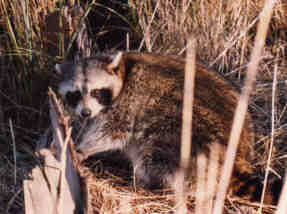We are raccoon removal & control specialists. We will humanely remove raccoons from your property, clean and sanitize the area, and ensure you are safe from future visitors.
Raccoons can be extremely troublesome and destructive to homeowners and farmers. They are agile climbers often taking up residence in attics and chimneys as well as burrowing under porches and patios. Raccoons are responsible for millions of dollars of damages to crops as well as infecting cattle,sheep, hogs, horses, etc with diseases by living in barns, livestock feeders and feed bunkers. They adapt easily to new environments and will eat almost anything. Pet food and garbage are very attractive to raccoons as food sources. Koi and fish ponds are also a source of food (not to mention costly to the owner).
Raccoons typically have an average of 4 kits in a litter, once a year. The most common months for raccoons to give birth are March, April and May. Mating season is typically January through March. If you have a raccoon problem in the months of October through January, there is not a litter involved.
Signs of a raccoon problem:
-
Overturned trash cans and scattered trash.
- Insulation hanging from your roof of soffits.
- Portions of your soffit or fascia hanging down.
- Gable louver vents with bent or missing louver fins.
- Holes 4″-6″ in your roof or wall.
- Heavy footsteps in your attic.
- Cigar shaped droppings on your roof, porch or in animal feeding areas.
- Portions of your lawn rolled or dug up from grubbing.
- Juvenile raccoon pups make a chattering noise similar to birds chirping.
- Prints or smears on the sides of downspouts, utility poles, fire escapes or decks—raccoons like to climb.
- Tracks in mud or soft earth.
-
Burrow entrances, which are usually at least 4″ high and 6″ wide. Bits of fur may be present.
-
Disappearing fish from ornamental ponds.
Raccoons also carry many diseases, such as rabies, distemper, and roundworm. Even an animal that does not appear sick can be a carrier, posing hazards to pets and humans. Rabies carried by raccoons is extremely virulent, and passes between raccoons and other animals more easily than that carried by other animals. Raccoons in urban areas often lose their fear of humans and pets, making them even more of a threat.
Raccoons can be very large- the largest on record was 72 lbs! Because of their size and often-nasty tempers, they are quite difficult for most homeowners to manage on their own.
